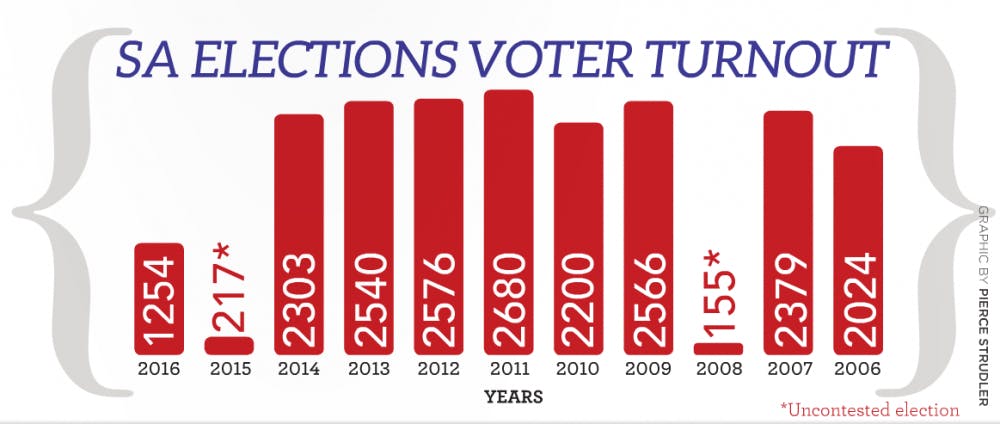Roughly one percent of the undergraduate population voted in last year’s uncontested Student Association elections. And this year, despite a contested election, did not bring much better results, as just 1,254 students or six percent of undergraduates hit the polls.
SA elections historically bring in a low percentage of student voters, who all pay SA $104.75 a semester through the mandatory student activity fee. Normally just 10-15 percent of students vote to decide who will sit on SA’s executive board of president, vice president and treasurer.
But the past two years’ lower-than-normal numbers have SA members both current and former questioning why so few students are voting or even running, as this was the second straight year the elections could not field two parties with SA experience.
Transparency Party presidential candidate Maximillian Budynek, who along with his vice president running mate Daniel Christian had no prior SA experience, has said that this year’s SA elections show for “the need to overhaul the election process.”
“Two days of speaking to clubs, and a poorly advertised debate, are simply not enough,” Budynek wrote in his letter to The Spectrum. “A more publicized election will allow for a greater exchange of ideas and more student involvement.”
Budynek said that when campaigning in the Student Union last week, many students he spoke with were unaware the elections were even happening. He said SA doesn’t do enough to promote the election, which hinders the ability for candidates outside SA to be competitive, as their message would resonate better with a large mass of students.
Carl Ross, an SA senator who ran for treasurer this year, also told The Spectrum after his defeat that SA could do more to market the election.
UB alumnus Carson Ciggia said he remembers SA elections voter turnout always being low and that once he realized the impact SA had on his “UB experience,” he felt he needed to become involved. Ciggia ran for president of the Forward Party in 2013, but ultimately lost to the Spirit Party.
Carson, who was SA’s Academic Council coordinator, said the student body is unaware of the elections and if students realized “who calls the shots” with their mandatory student activity fee, they may be “more inclined to vote.”
Travis Nemmer, a UB alumnus who served as SA president in 2012-13, said he thinks SA does all it can to make students aware an election is going on and ultimately it’s the candidates’ responsibility to bring students to the voting booths.
“It’s certainly on the campaigns more than the SA to advertise the election because that’s just good politicking,” Nemmer said. “It’s not part of an institutionalized failure on SA’s part to say that students don’t know about the election, it’s on the parties.”
Nemmer said his theory is SUNY delegates no longer being involved in the election has led to less candidates running and the lower-than-usual voter turnout.
Previously, presidential and vice presidential candidates would run with four SUNY delegates on their ticket, however SA Assembly and Senate amended the constitution in 2014 to give the president-elect the power to appoint SUNY delegates – taking delegates out of the race.
Without delegates in the election, there are less candidates vying for votes and therefore less of an electorate being reached out to.
Although SA made the move in the hope that it would encourage more students to run, as president and vice president candidates would no longer have to find an entire set of delegates to run, Nemmer said it might have had the opposite effect.
He said taking the delegates out of the election takes away a parties’ chance to be competitive against the favored party running for e-board, as delegates were often put on tickets to help gain votes.
Current SA President Minahil Khan said she also thinks the low voter turnout this year was the result of this year being the first contested SA election without SUNY delegates.
She said SA should look into holding online elections rather than having students vote in person, as other universities do, but that a discussion would be needed before doing so. That’s because SA would not be able to hold an election on a secure server, because until this year, the elections brought in too many voters than one could hold. Khan said holding the vote online would mean SA has no way of regulating the voting.
Budynek said that the incoming e-board of Matt River, Megan Glander and Dan Emmons are qualified and supported for their positions, but that they should consider ways improve student involvement in the SA elections.
“The upcoming administration needs to address this issue,” Budyenk wrote, “or face another year of a disenfranchised student body with indifferent feelings towards their ‘representatives.’”
Marlee Tuskes is the senior news editor and can be reached at marlee.tuskes@ubspectrum.com. Follow her on Twitter at @marleetuskes5.





